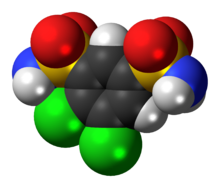Diclofenamide
 | |
 | |
| Clinical data | |
|---|---|
| AHFS/Drugs.com | International Drug Names |
| MedlinePlus | a601233 |
| ATC code | |
| Pharmacokinetic data | |
| Protein binding | 55% |
| Identifiers | |
| |
| CAS Number | |
| PubChem CID | |
| IUPHAR/BPS | |
| DrugBank | |
| ChemSpider | |
| UNII | |
| KEGG | |
| ChEBI | |
| ChEMBL | |
| CompTox Dashboard (EPA) | |
| ECHA InfoCard | 100.004.037 |
| Chemical and physical data | |
| Formula | C6H6Cl2N2O4S2 |
| Molar mass | 305.14 g·mol−1 |
| 3D model (JSmol) | |
| Melting point | 228.5 °C (443.3 °F) |
| |
| |
| | |
Diclofenamide (or dichlorphenamide) is a sulfonamide and a carbonic anhydrase inhibitor of the meta-disulfamoylbenzene class. Dichlorphenamide as a carbonic anhydrase inhibitor is used for the treatment of acute angle closure glaucoma. While Dichlorphenamide does contain two sulfate groups within the structure, it falls under the class of a first generation carbonic anhydrase Inhibitor.
Uses
[edit]Diclofenamide was approved in the United States in 1958 as Daranide to treat glaucoma,[1][2][3] Subsequently, it was found effective in cases of therapy-resistant epilepsy.[4] In 2015, the medication was approved in the US under the name Keveyis as an orphan drug for the treatment of primary hypokalemic and hyperkalemic periodic paralysis.[1][5]
Cost
[edit]In 2001, diclofenamide had a U.S. list price of $50 for a bottle of 100 pills, and was approved for glaucoma. Merck discontinued diclofenamide when better glaucoma drugs were developed. In 2010, Sun Pharmaceutical Industries bought the rights.[citation needed] In 2015, the F.D.A. approved it as an orphan drug, with 7-year exclusive marketing rights, for periodic paralysis, which the company estimates affects 5,000 people in the U.S. In 2016, Strongbridge Biopharma acquired Sun, which raised the price to $15,001 for 100 pills. The cost of treatment would range from $109,500 to $219,000 a year. Sun gives the drug free to patients who don't have insurance.[5]
References
[edit]- ^ a b "Dichlorphenaide (Keveyis) for Periodic Paralysis". The Medical Letter. April 16, 2016. Retrieved December 19, 2017.
- ^ International Drug Names: Diclofenamide
- ^ Kanski JJ (August 1968). "Carbonic anhydrase inhibitors and osmotic agents in glaucoma. Carbonic anhydrase inhibitors". The British Journal of Ophthalmology. 52 (8): 642–3. doi:10.1136/bjo.52.8.642. PMC 506660. PMID 5724852.
- ^ Rucquoy M, Sorel L (1978). "Diclofenamide in the treatment of therapy-resistant epilepsy". Acta Neurologica Belgica. 78 (3): 174–82. PMID 352085.
- ^ a b Johnson CY (December 18, 2017). "This old drug was free. Now it's $109,500 a year". Washington Post.
